
“Good Nutrition” Section Overview
A lot of what we eat is determined by what we like and not how good it is for us, and many people use food to make themselves feel better. Unfortunately, this often leads to poor food choices and eating too much. In this section, I will explain, based on scientific studies, what kind of diet is best for you. Then, I’ll show you how you can improve your nutrition in an easy and tasty way. The good news is that you can easily make the changes in small steps, and still get great benefits along the way. So dig in and start your journey to a longer and healthier life.
Welcome to the Good Nutrition section of the 13 Steps to a Great MiddleAge course!
Although your beliefs and attitudes are undoubtedly the most important aspects of creating a happy and healthy life, fitness and nutrition are also very important. In this section I’ll show you how nutrition can affect your health in a very-big way. Middle-aged men and women who have good nutrition have a great start to a healthy life.
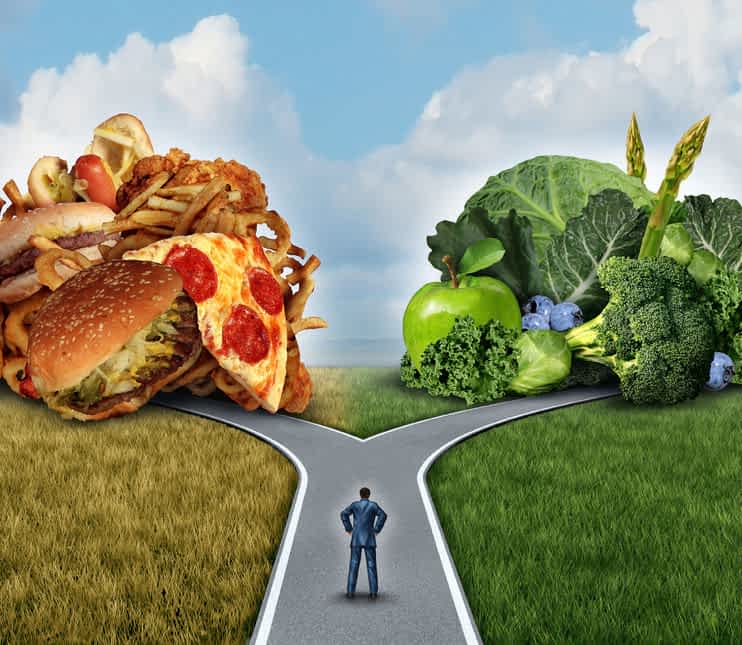
The first part of good nutrition is something you already know about. Yep. It’s getting rid of the junk food. Of all of the things that you could do to give you a boost in your health and energy, this is the simplest and yet for some people, it may be the hardest.
As you likely know, food companies and restaurants know how to make foods that we love. They are often high in fat, which gives them a really nice ”mouth feel” and texture. Then there’s the sugar and the salt. All of that together can create something really tasty, and yet really bad for our health.
If you want to read more about how food companies make their foods “addictive”, click here.
In one way, I don’t blame them. They are in business to make money, and will often do everything they legally can in order to do that. The kicker though is that if and when we, the public, quit eating junk food, and more importantly, start demanding better food, then these companies will be selling it.
In fact, I recently read that Whole Foods is having financial problems, and one reason is that mainstream food stores are selling things like organic produce and other health-type products, and taking a bite out of the Whole Foods profits.
In another example, Orowheat, a mainstream baking company in business since 1932, recently came out with a “copycat” version of Dave’s Killer Bread, obviously because 1) They saw Dave’s taking a bite out of their market, and 2) It would be a product that would sell.
Because I constantly read up on the latest news for happiness and health, I continue to see items about different companies putting out healthier food. But in most cases, that’s not because they’ve decided to be “good guys”. They’ve just realized that people want healthier items these days, and so they are providing them.
But don’t just leave it up to food companies and restaurants to lead the way to your health. Make the decision now to have good nutrition in your life.
It’s pretty simple. Eliminate as much sugar as possible from your diet. Eliminate candies, cookies, cakes, pies, sodas, and even fruit juices. Replace white breads and pasta with whole-grain items. Ditch the potato chips. Get rid of all of this stuff from your kitchen so you won’t be tempted.
At the same time, you’ll need to stock up on healthy replacements. Have fresh or frozen fruits available. Figure out what veggies you like, and then make sure you have them available. By the way, to some degree frozen vegetables are not a bad choice. In fact, in some cases they have more nutrition than “fresh” vegetables because they’ve been picked and frozen within a very short time. So grab yourself some frozen broccoli florets, and cook some up to have with your dinner.
Eat salads, and add some vegetarian “meat” to them. These days, my lunch is a salad made from organic spring greens, celery, tomato and 1/2 of a Tofurky vegetarian sausage.
By the way, as part of my research for the best health tips, I just read an article that said the healthiest way to prepare broccoli is to put it in a microwave-safe bowl with a few tablespoons of water, and cook it up. The article said that this preserves more of the nutrients than cooking it either in a pan of water, or even steaming it.
If removing junk food from your diet entirely seems impossible, just make small changes over time to improve your health. For example, instead of buying crackers made with enriched flour and partially hydrogenated oils, switch to whole-grain crackers. Top them with vegan cheese for an afternoon snack. Eventually, replace the crackers with a slice of apple topped with cheese for a snack even richer in nutrients.
You see, making changes in small steps can make it almost painless. Let me explain. So, make the changes so tiny at first that you almost don’t notice them. Don’t try to change your whole diet, all at once. Instead, just drink a smoothie each morning. Or just have a glass of water before you eat a meal. Or just replace white rice with brown, or white flour with whole wheat.
When the changes are small like this, they take a lot less effort. Your willpower doesn’t drain, and your life improves in a steady way.
But when you understand how to change habits, you know that even though the changes aren’t visible, it doesn’t mean nothing’s happening. Because on the inside, each time you repeat the tiny, effortless step, you’re adding another thread to a cable. A cable that will soon become an automatic, rock-solid new habit.
And in a month or two, when the changes have become much bigger, and now ARE showing up on the outside, you still don’t notice any real difficulty. Because right along with your behavior, you have changed as well. And the new way…has become your new normal.
(Thanks to Matt Frazier for this great tip. Check out his info at nomeatathlete.com)
So, Consider substituting fresh fruit for the pie you may usually have for dessert. Or, cut the pie into small portions. I love fruit pie, but I get 16 slices out of one pie. Try having a grain like barley instead of mashed potatoes.
To get down to the core, the truth is the more your diet contains unprocessed or minimally processed foods, the healthier you will be. More and more studies these days are proving this.
This means more vegetables, some fruits, and whole grains and beans, as well as nuts and seeds. This may sound really boring, but there are many vegetarian recipes that are really tasty!
If you want to have a healthy diet, you will likely have to change some of the foods you eat, including possibly some of your favorites. But you will find new foods to eat, and some of those may become your new favorites, if you give them a chance. Some changes may not be easy, but the reward will be the way you will feel and feel about yourself when you have lost weight and have the energy you’ve always wanted to have.
You’ll be dropping refined foods that have never been good for your body, regardless of whether they put weight on you or not. You’ll be replacing them with whole foods which you will learn to enjoy. After you have eaten minimally processed foods for a period of time, if you again try to eat a Twinkie, you’ll likely find the taste repulsive.

Most important in having good nutrition is the elimination of highly-processed foods, especially those with a high sugar content. More and more studies are showing that eating too much sugar is the cause of many diseases.
This doesn’t mean you can’t eat anything that has sugar in it, but it means that you need to be aware of how much sugar you eat, and limit it to a reasonable amount, the less, the better. The latest government study suggests no more than 50 grams a day.
Eliminate all sugary drinks if possible, as well as any diet drinks. By the way, this also includes cutting way back on or eliminating fruit juices. Yes, fruit juices can be “natural”, but in nature you don’t have fruit juices. You have to eat the fruits and as you eat them the sugar is released into your system much more slowly than drinking a fruit juice. Also, eliminate as many refined products as you can, such as cookies, cakes, other sweets, candy bars, etc.
When you eat a high-sugar food, a number of bad things happen.
Not enough for you? Then consider these points:
It has been said that eating junk food causes a surge of pleasure hormones like dopamine and serotonin, but it’s not worth it in the long run.
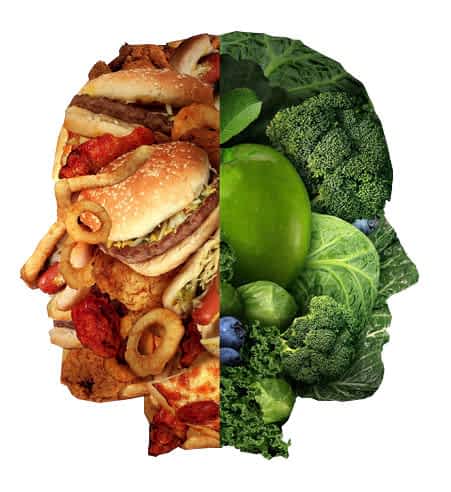
I have to mention here that I have given a lot of thought to this section. I don’t want you to start reading it and then leave because I strongly suggest a plant-based diet. But in truth, I would not be being honest with you if I did anything else. I’m not suggesting a plant-based diet because I’m some kind of wacky tree-hugger or old hippy. I’m suggesting it because scientific studies have shown that it’s the healthiest diet you can follow.
So, I ask you to at least read on for a bit and see what I have to say.
I will present you with really-great information from highly-respected sources and studies that will show that these ideas aren’t just some wacko New Age idea, but solid science.
You will find that good nutrition can save your life, and, as the saying goes, not only put more years in your life, but more life in your years.
I also want to say that, like all other sections of this Website, nutrition is not an “all or nothing” issue. You can, and likely should, make changes at a reasonable pace. Maybe try out vegetarian meat substitutes like Tofurky sausages or MorningStar Farms Chickn Nuggets, which are available at health food stores like Whole Foods or Sprouts, as well as at some stores such as Albertson’s. I tried out 2 of Aldi’s “Earth Grown” items. Their “chickenless patties” were greasy and tasted terrible. I also tried their Quinoa Crunch veggieburger, and it was not good at all.
Before we move on, I have to tell you that I’ve been following a vegetarian diet for most of the last 50 years, and a vegan diet for the past 8 years. Although I believe that a plant-based diet is the best one for your health as well as the health of our planet, I don’t judge people as wrong for eating meat. You might, however, find this article interesting:mation which I found just today in an article at https://ecowatch.com/2016/04/30/true-cost-cheap-meal/
A study of more than 6,000 adults, published in the journal Cell Metabolism, found that people with diets high in animal protein were 74 percent more likely to die before the end of the study than people with diets low in animal protein. The study also found that people with high protein diets were four times more likely to die of cancer—the same mortality risk as smoking cigarettes.
Several studies have shown that vegetarians are approximately one-third less likely to die of heart disease, diabetes or stroke. If a pill were shown to make these causes of premature death 33 percent less likely, it would be prescribed by every doctor in the country. Yet there is an even simpler, less expensive solution, one without any negative side effects.
Think about it. “74 percent more likely to die” “four times more likely to die of cancer” Do you want to to take those odds because you love the taste of a steak or a chicken leg? Are you willing to die for those tastes? Seriously?!
In general, I don’t have any ethical concerns with eating dairy products, although I believe in eating only free-range eggs, but I am concerned with the high amounts of saturated fat in our favorite dairy product, cheese. Also, there are many different proteins in milk to which one can be allergic. Allergy symptoms can include colds, lots of mucous and asthma.
I myself suffered from mild asthma for about 30 years and was using a rescue inhaler about 6 times a day when I finally quit using one due to the heart problems that I believed it was causing.
At that time, I switched to a vegan diet, and my asthma symptoms have almost disappeared. In addition, the excess mucus and constant clearing of my throat disappeared, so much so that friends would remark “You’re not clearing your throat all the time like you used to”.
In being totally-honest with you, I have to admit that there are some nutrients that you must watch if you are on a plant-based diet. They are protein, calcium, Vitamin B12, Vitamin D, DHA and EPA, Iodine, Vitamin K2 and Zinc .
Here’s a great article on this: https://www.nomeatathlete.com/supplement-vegan-diet/
For a multivitamin, the very-best one I can suggest is Whole Earth & Sea. They are made with high-quality standards from food they grow on their own farms. Check them out at https://www.wholeearthsea.com/
Having gotten that out of the way, I do want to say that more and more people are eating a plant-based diet. And yet, they are still a very small portion of the population. The question is, to you just want to follow the herd, or if you see a good reason to make a change, will you do it?
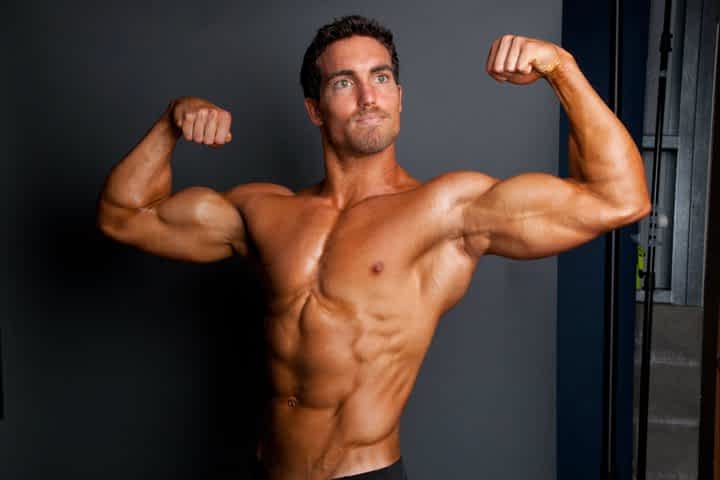
Derek Tresize, above, looks pretty-healthy for a mere vegan bodybuilder!
Here’s another vegan bodybuilder, Jim Morris. who shows it’s possible to look great even as you age. He became a vegetarian at age 50 and a vegan at age 65. How would you like to look like he did at age 71?!
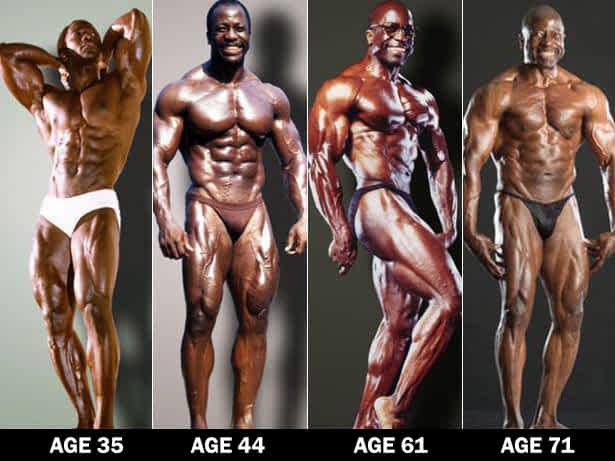
And having a great body on a healthy diet isn’t just for the guys. Take a look at fitness model and vegan bodybuilder Crissi Carvalho, and see how great she looks at age 42! In February, 2016 she took 1st place in the IFBB Bikini Masters competition in the “35+” division. That means she was competing with women from all over the world who were as young as 35, and was judged the best! Way to go, Crissi!
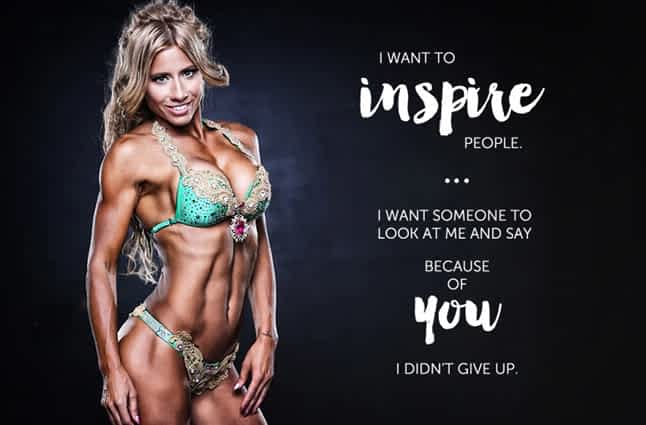
If you think that a vegetarian or vegan diet is for wimps, I suggest you take that up with a gorilla, who weighs from 300-400 pounds and lives on a vegan diet. LOL! If you want to see some proof of the possibilities of a vegan diet, go here: greatveganathletes.com
If you’re concerned about getting protein, especially for bodybuilding, don’t worry. Besides lots of plant-based protein supplements, there are lot of foods that provide protein. They include, nuts and seeds, soy products, beans and grains like quinoa and amaranth. There are also some great protein supplements.
I personally use Orgain Plant Protein, which you can read about here. It has a great taste and texture, and I seem to digest it well. You can read an article that complains about Orgain’s ingredients here, but keep in mind, that the guy who wrote it is trying to sell his protein powder which costs more than double the Orgain price, although his ingredients look very good.
There’s also Garden of Life protein powder, which seems very clean, but it’s also relatively expensive compared to Orgain, but not as pricey as that from Pure Food. If money is a concern, always determine the cost per gram of protein.
With 21 grams of protein in 2 scoops, and all from organic pea protein, organic brown rice protein, organic chia seed and organic hemp. Add that to 8 oz. of Silk Protein Nutmilk and you’ve got 31 grams of protein.
That’s the same amount of protein you’d get in a Big Mac, but instead of getting 11 grams of saturated animal fat with the burger, you’re getting 1/2 gram of vegetable fat from the nut milk and zero grams from the powder. The best price I found online was at Costco.
There are quite a few opinions of how much protein to eat. The one I have seen most often is to eat about .4 grams of protein for every pound of bodyweight you have. If you’re physically very-active, and are doing sports, then maybe use a bit more. One study I read stated that if you eat any more that that, it winds up in the toilet.
If you want the scientific lowdown, here’s what I gleaned from a study I found on the Website of the United States National Institutes of Health:
In the current study, participants consumed approximately 30 g or 90 g of high-quality protein in a single serving. The key finding was that no further protein synthetic advantage was elicited by the larger meal when compared to the response to a more moderate 30g protein serving (20). In terms of stimulating muscle growth, it therefore appears likely that under resting/non-exercising conditions, consumption of more than 30 g of protein in a single meal is not justified. Indeed, it may well be the case that a slightly smaller meal would produce a similar protein synthetic response.
ncbi.nlm.nih.gov/pmc/articles/PMC3197704
Here’s what that means. A meal containing 30 grams of protein boosted muscle-building activity by about 50%. It turned out, however, that increasing the amount of protein in the meal above that amount didn’t create a bigger boost in muscle creation. On average, subjects who ate 90 grams of protein at a meal got exactly the same benefit as subjects who ate 30 grams.
So, if you weigh 160 pounds, you should eat 64 grams of protein a day. In being transparent, I have seen a lot of other numbers, even from a vegan bodybuilder, of up to 2 grams per pound, but I don’t believe that’s necessary. If you are very active and are working out hard, increasing your protein even up to .8 grams per pound may make sense. If you want to, go ahead and try eating more and see how you feel.
Here’s a great article about the benefits of dropping dairy from your diet:
http://news.yahoo.com/7-things-happen-body-dairy-125431892.html
How to get enough protein in your plant-based diet:
https://www.yahoo.com/health/how-to-get-lots-of-protein-as-a-vegan-202802557.html

In 2013, an article titled A Nutritional Update for Physicians was published in the official journal of Kaiser Permanente, the largest managed care organization in the United States. It told physicians that healthy eating may best be achieved with a plant-based diet, defined as a regimen that “encourages whole, plant-based foods and discourages meats, dairy and eggs as well as all refined and processed junk.” I believe this especially applies to middle age men and women, as our bodies don’t heal as quickly as when we were young and we are more susceptible to disease.
The Update notes: “too often, physicians ignore the potential benefits of good nutrition and quickly prescribe medications instead of giving patients a chance to correct their disease through healthy eating and active living. Physicians should therefore consider recommending a plant-based diet to all their patients, especially those with high blood pressure, diabetes, cardiovascular disease, or obesity.”
The major downside described is that it may work a little too well. If people are on medications, their blood pressure or blood sugar could actually drop too low, so physicians may need to adjust medications or eliminate them altogether.
The report continues that “despite the strong body of evidence favoring plant-based diets, many physicians are not stressing the importance of plant-based diets as a first-line treatment for chronic illnesses. This could be because of a lack of physician awareness or a lack of patient education resources.”
So Kaiser sought to change that. “Want to lose weight, feel better, improve, stabilize, or even reverse chronic disease, and get off some of your medications?” a Kaiser Permanente leaflet (which you can see in the video, What Diet Should Physicians Recommend?) asks. “If you answered ‘yes’ to any of these questions, then a plant-based eating plan may be for you.” You can download that leaflet here Kaiser Permanente New Plant Based Nutrition Booklet.
Side-effects include: lower cholesterol, blood pressure, and blood sugar; reversal or prevention of heart disease (our number one killer); a longer life; a healthier weight; lower risk of diabetes; improvement of inflammatory conditions like rheumatoid arthritis; and a slowed progression of certain types of cancer.
How would you like these health benefits in your life?
My point of telling you all this is not that I believe you’re going to follow a vegetarian or vegan diet, although you may. I do, however, hope that you will make more of your diet plant-based. All of the evidence points to a lot of benefits.
I can’t over-emphasize that in diet, as in all sections of this Website, radical changes are not what usually works for most people. What works best for most is gradual change. Try the “Meatless Mondays” plan, and skip meat for one day a week.
Here’s one easy way to decide what to eat for your meals, called “The Plate Method”. It’s from the recent Kaiser Permanente ebook titled “The Plant-Based Diet”. You can download it by clicking here.
Use the “Plate Method” to portion your food in an easy and healthy way for lunch and dinner.
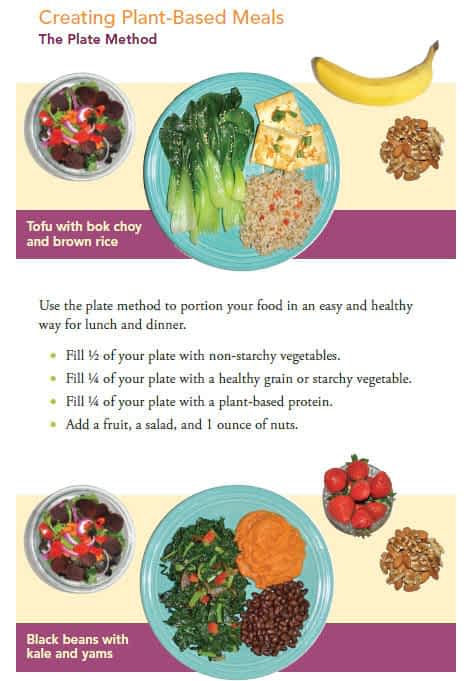
Now, don’t get all freaked-out that you’re going to have to live on alfalfa sprouts and water. To start with, if you have a meal like the above one, you’ll feel pretty-full. In addition, this, like everything else on our site, is not an “all or nothing” deal. You can start by cutting down the portion size of any meat in your meal, and adding in, or increasing, the portion size of one or more of the other elements.
Also, there are many plant-based meat and dairy substitutes that you can try out. I have been following a vegetarian diet for most of the past 50 years, and have tried lots of them. Some are pretty-bad. Others are great.
One of my favorites is Daiya brand “cheeze” http://us.daiyafoods.com/, which has zero dairy products in it. I love Daiya cheese, and I eat some every day.
In the morning, I have a slice of Dave’s Killer 21 Grains and Seeds bread, with some Daiya “cream cheeze style spread”. This stuff is epic! I rarely ate cream cheese before, but I LOVE this stuff!!
Then, later in the day, I will have a slice of their “cheeze” slices, which comes in flavors of American, cheddar, Swiss and provolone. I might put it on a veggieburger sandwich (with Dave’s Killer Thin-Sliced bread). I put the “burger” in the microwave for about 1/2 of the cooking cycle, and then put the slice of cheeze on top. Back into the micro for the rest of the cycle, and then eat and enjoy!
Other good vegan sausages are from Tofurky, such as their Chick’n & Apple Artisan sausage, Spinach Pesto, Kielbasa and Ber Brats. Check their whole line of products out at http://www.tofurky.com/. I love the flavor and they have a nice texture. Here’s a hint for preparation of a sausage if you’re not going to cut the sausage up and put it in something like stew or scrambled eggs, but maybe want to put it in a sandwich.
Prepare it by cutting it into slices and then microwaving it for about a minute or so in a small dish with about two tablespoons of water. It will then be nice and tender and delicious too!
One more great “fake meat” I like is the Worthington Meatless Smoked Turkey Roll. I love the texture of this item, and it’s great on a sandwich. Add some tomato and maybe some mayo, and you’ve got some good eating. This is a big 4-pound roll, and it’s not easy to find because it’s more an item for a restaurant than for home use. You can try calling Heritage Health Foods, who makes this product, and see if they will connect you up with a distributor in your area. Their number is 888-237-0807.
Also you can call around to your local health food stores to see if they have it or can order it for you. When you get it, I suggest you slice it right away, and then freeze the slices in bags of maybe 8 ounces each. Otherwise, it may go bad if it takes you a month or two to eat it.
For meat substitutes, I suggest you see what’s at your local health-food store and try some out to see which ones you like. Try the stuff from Gardein (www.gardein.com) & MorningStar Farms (morningstarfarms.com). Yes, there are some ingredients in the Morningstar Farms products that aren’t optimal, but they’re better than eating meat. In time, you will likely transition away from them. Here’s a way to make your own: https://www.onegreenplanet.org/vegan-recipe/sweet-potato-burger/.
MorningStar makes a veggie bacon that’s pretty-good. I cook mine in the microwave for 1:33 on a paper towel. Take it out and right away (careful, it’s hot) lift it away from the towel to let it cool. It will then be nice and crispy. :o) Also try their Sausage Links and their Original Chick Patties.

I just read part of an epic article on fats and nutrition. I call this article “epic” for two reasons. The first one is that it’s a very long article. It covers all of the aspects of consuming fats. The second reason is that it is from the Harvard School of Public Health, which I consider to be a highly trustworthy source.
www.hsph.harvard.edu/magazine-features/is-butter-really-back/
I won’t attempt to cover everything that article, but I will mention a few important topics.
The first is a summary. Considering how much confusion there is around fats in the diet, I think this is really important.
“In the case of dietary fat, most scientists do agree on a number of points. First, eating foods rich in polyunsaturated fat will reduce the risk of heart disease and prevent insulin resistance.
Second, replacing saturated fat with refined carbohydrates will not reduce heart disease risk. Third, olive oil and coconut oil are good for you—as are nuts (especially walnuts), which, while they include some saturated fat, are also high in unsaturated fat, tipping the balance in their favor. Finally, omega-3 and omega-6 fatty acids are essential for many biological processes—from building healthy cells to maintaining brain and nerve function—and we should eat a variety of healthy foods, such as nuts, seeds, and vegetable oils, to obtain adequate amounts of both fatty acids.”
Another important conclusion that was drawn in this report is as follows:
“The findings demonstrate that, in practice, when people lower their saturated fat intake, they don’t necessarily eat healthier diets. Saturated fat is found in a range of foods—including not only butter and meats but also milk, yogurt, cheese, nuts, and vegetable oils.
Each of these foods has different effects on heart disease. Instead of emphasizing one nutrient, we need to move to food-based recommendations. We’re not going to artificially create healthy diets by manufacturing low-fat, low-saturated-fat packaged foods. What we eat should be whole, minimally processed, nutritious food—food that is in many cases as close to its natural form as possible.”
Elsewhere on the Harvard site, I found this advice:
“When people reduce their saturated fat content, if they replace saturated fat with refined carbohydrates like white bread, bagels, and white rice, it is not going to do any good, because eating too many refined carbohydrates is also a risk factor for heart disease.
Instead, try eating more healthy fats such as vegetable oils, avocados and nuts—which can help to lower heart disease risk. Moderation with these healthy fats is still important. Dietary guidelines recommend that we get no more than 10% of our daily calories from saturated fat.”
You will notice that this recommendation is the same as mine earlier on this page. It’s not that I’m some sort of genius, just that this recommendation is so solidly based that many nutritional experts agree with it.
Do keep in mind that healthy fats are an excellent source of energy. So consider choices such as nuts, seeds and avocados which add great taste, great nutrition and the lack of that hungry feeling.
In summary, if you want to be healthy, you need to eat a clean diet. Ideally, it is plant-based, with minimal animal products. But it’s not an
all-or-nothing plan, and you can make the switch over time, replacing processed foods with whole foods, etc. Start today!
I could list all of the Websites that have steps to transition to a vegetarian diet, but the best thing to do is to do a Web search for “how to transition to a vegetarian diet”.
A few I thought were pretty-good were:
http://www.onegreenplanet.org/vegan-food/step-by-step-guide-how-to-transition-to-vegan-diet/
http://easyvegetarian.net/thefirststep.html
Also, there are lots of videos on YouTube.
Finally, grab a vegetarian cookbook and try out some things that look interesting.
Above all, don’t make this some sort of struggle or heroic sacrifice. Yes, it will take effort, but look on it as an adventure, not a punishment. ;o)
Now that you are happy and eating right, it’s time to get fit, so hop on over to my Physical Fitness section of the course.